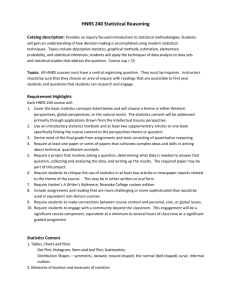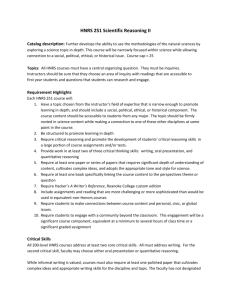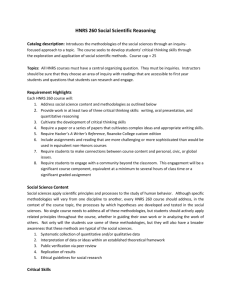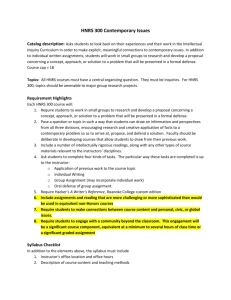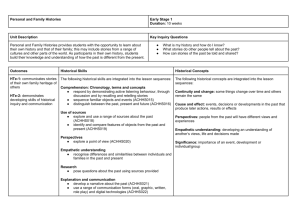HNRS 241 Guidelines
advertisement
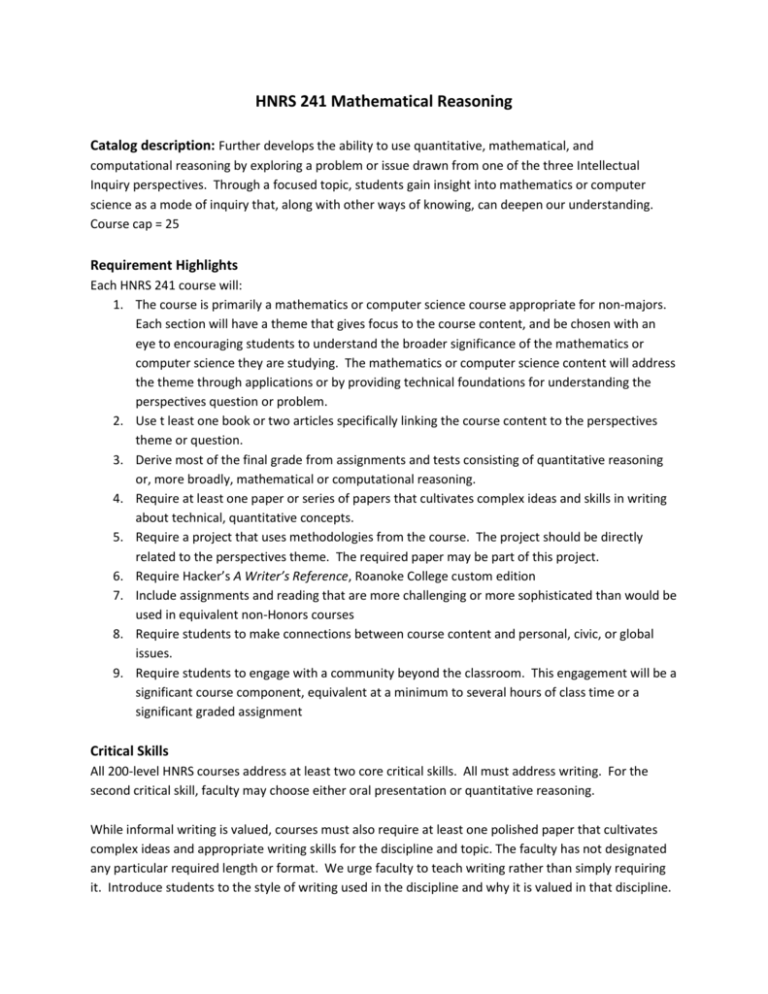
HNRS 241 Mathematical Reasoning Catalog description: Further develops the ability to use quantitative, mathematical, and computational reasoning by exploring a problem or issue drawn from one of the three Intellectual Inquiry perspectives. Through a focused topic, students gain insight into mathematics or computer science as a mode of inquiry that, along with other ways of knowing, can deepen our understanding. Course cap = 25 Requirement Highlights Each HNRS 241 course will: 1. The course is primarily a mathematics or computer science course appropriate for non-majors. Each section will have a theme that gives focus to the course content, and be chosen with an eye to encouraging students to understand the broader significance of the mathematics or computer science they are studying. The mathematics or computer science content will address the theme through applications or by providing technical foundations for understanding the perspectives question or problem. 2. Use t least one book or two articles specifically linking the course content to the perspectives theme or question. 3. Derive most of the final grade from assignments and tests consisting of quantitative reasoning or, more broadly, mathematical or computational reasoning. 4. Require at least one paper or series of papers that cultivates complex ideas and skills in writing about technical, quantitative concepts. 5. Require a project that uses methodologies from the course. The project should be directly related to the perspectives theme. The required paper may be part of this project. 6. Require Hacker’s A Writer’s Reference, Roanoke College custom edition 7. Include assignments and reading that are more challenging or more sophisticated than would be used in equivalent non-Honors courses 8. Require students to make connections between course content and personal, civic, or global issues. 9. Require students to engage with a community beyond the classroom. This engagement will be a significant course component, equivalent at a minimum to several hours of class time or a significant graded assignment Critical Skills All 200-level HNRS courses address at least two core critical skills. All must address writing. For the second critical skill, faculty may choose either oral presentation or quantitative reasoning. While informal writing is valued, courses must also require at least one polished paper that cultivates complex ideas and appropriate writing skills for the discipline and topic. The faculty has not designated any particular required length or format. We urge faculty to teach writing rather than simply requiring it. Introduce students to the style of writing used in the discipline and why it is valued in that discipline. Show them how source material is incorporated and cited in the discipline. We urge faculty to require a draft and to consider use of peer review, conferences, and consultations with the Writing Center. Courses with oral communication as the second critical skill must require a formal oral presentation. Participation in discussion is not sufficient. Oral presentations may be individual or group. Debates and other variants of presentations are welcomed as long as the assignment requires thesis, support, and advance preparation. Faculty members are urged to teach presentation skills rather than simply requiring a presentation. Courses that emphasize quantitative reasoning as the second critical skill must teach QR skills appropriate for the course’s discipline and include one major or a series of smaller assignments that require students to demonstrate at least three of the following five skills: 1. Gather or select data appropriate for its intended purpose including consideration of appropriate controls, variables, and conditions. 2. Represent data to help reveal its utility for a given purpose by creating tables, graphs, figures, calculations or models. 3. Interpret important features or trends in data from tables, graphs, figures or models. 4. Use data in decision-making; explain how quantitative evidence supports conclusions. 5. Handle uncertainty or significance of data by applying or interpreting measures of uncertainty, error, or statistical significance. Syllabus Checklist In addition to demonstrating the elements above, the syllabus must include 1. Instructor's office location and office hours 2. Description of course content and teaching methods 3. The learning outcomes for HNRS 241 as listed below. Instructors may, if they wish, include additional learning outcomes beyond the common set or may include some additional comments about how the common learning outcomes are realized in this specific course. 4. Any materials that students are expected to buy, read, or use during the course 5. Classroom and attendance policies (with penalties explained) 6. Assignments students will be required to undertake 7. Grading policy (ideally a grading scale with penalties explained) 8. Testing policy, including make-up tests 9. RC's academic integrity policy as it applies to the class 10. An outline showing proposed topics, students' assignments, reading list, laboratory work, etc. to be required. The focus of inquiry 11. Be sure that any boilerplate sections (e.g. related to tutoring or Writing Center) are up to date and appropriate for the course. Learning Outcomes for HNRS 241 --these must go on the syllabus. Instructors may add sectionspecific outcomes if desired. 1. Students will be able to describe and apply methodologies of mathematics or computer science appropriate for the course’s discipline and topic. 2. Students will be able to write about course topics clearly and effectively. 3. If the course is emphasizing oral communication: Students will be able to communicate effectively about the course topic in an oral format. If the course is emphasizing quantitative reasoning: Students will be able to interpret quantitative information related to the course topic. 4. Students will connect course content to their lives and to communities beyond the classroom. For Global Perspective Courses: 5. Students will be able to articulate how the course’s content explores a Global perspective. Additional Notes The instructor may choose to include oral presentation skills in addition to quantitative reasoning and writing. Topics and course content should not presume any specific knowledge of mathematics or computer science on students’ part though students will have completed either HNRS 240 or a mathematics or computer science course. However, the prerequisite structure for HNRS 241 reflects an increased expectation of intellectual maturity and critical thinking skills on the part of students, as well as introductory-level exposure to methodologies in statistics. These higher expectations should be reflected in the course content and in the intellectual tasks assigned. Be sure that your syllabus and/or descriptive materials in the course proposal form demonstrate that you are including required elements. In particular, be sure that connections to the chosen perspective are clear. Proposal Components The course proposal has three components that the committees can review to determine whether the course is clearly addressing the required components and characteristics: syllabus, focus of inquiry statement, and course proposal form. Committee members can’t read your mind; be sure the required elements are clearly laid out in these places. Focus of Inquiry: Not more than 150 words to describe the essence of your course and its inquiry. Students are the main audience, so write to draw them in. Faculty will also see this description in the faculty meeting agenda. This is a good place to describe the inquiry aspects of the course. Be careful not to include very specific information that could vary in later offerings since changes to this description have to be reported to CC. Syllabus: In addition to all the regular stuff you put on a syllabus, this is where the committees look for information on the level and volume of readings, types of assignments, instruction on writing, timing of drafts, etc. Help the committee by giving more detail than “Paper 3.” Consider including a paragraph that describes the assignment. (E.g., “Paper 3 will be a research paper on x, in which you will do y and z. Topic approval is due by this date, the annotated bibliography by another date, and the first draft by third date.”) Proposal Form: The questions on the proposal form try to focus on required elements, but also the most common concerns that the committee has had about proposals in past. Please try to answer the questions on the proposal form as directly as possible. Direct, specific answers need not be lengthy. FOCUS OF INQUIRY Each HNRS course must have a central organizing question. In the course proposal, this question must be included in the focus of inquiry, a statement of not more than 150 words that explains what focused questions the course addresses and how they are approached in the course structure. The focus of inquiry will be listed on the COL and should also appear on the course syllabus. Remember that students become the audience for this description in the COL. The course needs a focus; it should not be a survey. In typical gen-ed courses of old, the content was the primary driver, while the intellectual questioning wouldn’t be that obvious to the students. An HNRS course should make inquiry the primary driver. We should try to design courses where students are intrigued by the topics, stimulated by the questioning aspect and become interested in the content. Their intellectual curiosity is enhanced when they seek answers to the critical questions they’ve been posed or they ask of themselves. The bottom line is, we want to challenge our students to become thinkers by posing critical questions in a more deliberate way and provide them with useful tools to help them seek answers. Are some course features incompatible with inquiry? Not really, but courses that are emphasizing content delivery and where the classroom is instructor-centered rather than student-centered will need to work harder to develop inquiry features in other aspects of the course. All courses deliver content. Inquiry is a way of framing the course and its content. The inquiry nature of an HNRS course should also be evident in some aspects of the course’s structure, activities, or assignments. Questioning skills are promoted by deliberately framing the topic as an intellectually rigorous inquiry. Courses should make explicit attempts to explain to students why a particular investigation might be interesting or important. Many inquiry courses share features with scholarly inquiry. They go beyond merely exploring interesting topics to engage students in posing significant questions, seeking information, and proposing solutions. Other courses exhibit inquiry by emphasizing active roles for the students. In particular, a course may ask students to design experiments or choose topics to research. Many instructors choose to use questions to structure sections of a course and assignments. For example, the first third of a course might explore content related to a major question about the course topic. At the end of that section, students write papers where the theses propose answers to the question. While some may consider structuring a course around questions to be a mere mechanical device, it can be an easy way to keep inquiry visible to students. Questions that may seem mechanical to experts can be new and intriguing to students. Instructors should help students be aware of inquiry features in the course through aspects of the syllabus or assignments. DETAILS OF COURSE SCHEDULE AND ASSIGNMENTS Instructors will be asked to describe how this course satisfies all the requirements, and especially how the course satisfies those requirements that distinguish between INQ and HNRS courses. How much detail of the course schedule and assignments does an instructor need to include in a course proposal? Enough to allow the members of GEG and CC to see that the course is meeting the requirements. The committees look at course schedules to see how much time is being spent on readings, how class time is being used, whether instruction in writing and oral communication is included, whether methodologies are being discussed, if sufficient time for drafting is allowed, and if sufficient time for oral presentations is allowed. Details of assignments can be very helpful to the committee especially in appreciating the use of inquiry or how drafting is being used. While few instructors will have fully detailed assignments sheets, providing some details of the assignment topic and focus helps the committees appreciate what the instructor is doing (with inquiry, methodologies, writing instruction, or other outcomes) and can help avoid a round of clarifying questions. Instructors can include details in the syllabus or in Section 5 of the course proposal. WRITING All HNRS courses must require at least one polished paper. Instructors are strongly encouraged to do more than simply assign writing by including techniques that can help students improve their writing and reasoning. Instructors should consider the use of drafts, peer review, workshops, and Writing Center visits. No minimum page totals are specified.
